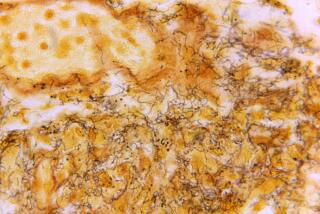AIDS Epidemic Doesn’t Spare the Elderly : Health: One recent patient was 90. Geriatrics specialists sometimes overlook the symptoms.
- Share via
CHICAGO — AIDS may seem like a young person’s disease, targeting mainly homosexuals, intravenous drug abusers, prostitutes and babies, but the epidemic also afflicts thousands of elderly people.
“It is indeed a problem of senior citizens as well as everybody else,” said Dr. Peter Drotman, an epidemiologist with the national Centers for Disease Control in Atlanta.
The CDC has recorded 2,332 cases of AIDS among people 65 and older during the last 10 years in the United States, out of a total of 161,073 cases as of Dec. 31, Drotman said in a telephone interview. That is the latest date for which complete figures on the elderly are available.
The oldest victim was 90 and got infected through a blood transfusion, Drotman said. Transfusions no longer are a significant source of infection, since blood banks began screening out the human immunodeficiency virus, which causes AIDS, in 1985, he said.
But because it can take 10 years for AIDS-virus infections to develop into the disease, the largest group of elderly cases are still those that resulted from contaminated transfusions. They account for 46.7% of the total, or 1,090 cases, Drotman said.
About 30% of elderly AIDS cases, or 699, have resulted from homosexual contact and about 2.5%, or 58 cases, from intravenous drug abuse, he said.
The oldest homosexual patient was 86, Drotman said, the oldest drug abuser 72. A 75-year-old patient was both a homosexual and a drug abuser.
“Risk behaviors most people associate with activities of younger adults are activities that senior citizens do indeed participate in,” Drotman said. “Physicians need to be aware that these are topics that senior citizens are interested in and need to receive prevention information on.”
Heterosexual contact has accounted for 161 elderly AIDS cases, Drotman said. Elderly hemophiliacs who have received contaminated blood products have accounted for 60, immigrants from Haiti or Africa for 14 and people infected from other or unknown sources for 232.
Many elderly AIDS patients died before the source of their disease could be determined or were dead before they were correctly diagnosed, Drotman said.
Wayne C. McCormick, a physician in the AIDS and geriatrics clinics at the University of Washington in Seattle, said AIDS in the elderly has “received no attention.”
At the 48th Annual Meeting of the American Geriatrics Society recently in Chicago, he reported on a Seattle woman diagnosed as having AIDS at age 84--only two years after she had stopped working as a prostitute.
“Who would think that this lady was engaging in a risk behavior for HIV?” he asked. “And even if she was doing that a couple of years before, she probably contracted it at least a decade before, when she was 70, or 65.”
Slightly more than 10% of people with an AIDS diagnosis are over 50, and about 1% are over 70, McCormick said. Of the total number of victims 65 or older, 1,797 were men and 535 were women, CDC figures indicate.
“There are more and more cases of AIDS in general, and therefore more and more cases of AIDS in the elderly,” McCormick said. “This is something that geriatricians and people who take care of older people are having to address.”
AIDS in older people tends to produce unexplained infections, mild pneumonias, headaches or a cough--all problems with many possible causes, McCormick said.
“Nowadays, it’s common for people with AIDS to have fairly nonspecific symptoms, like severe weight loss,” McCormick said. “It (weight loss) is very common in older people. I’d say average geriatricians don’t think ‘AIDS.’ They think ‘malignancy,’ or just the common malnutrition of advanced age.”
And diagnosing the disease correctly is just the beginning of the challenge, he said.
“We have to remember that the common diseases of old people still happen in old people with AIDS. Old people with AIDS still get heart attacks and still need their diabetes managed and still have strokes. So we can’t forget to work on those problems as well.”
Even though AIDS tends to advance rapidly in the elderly, some of them still can live at home until they die, McCormick said, citing his 84-year-old Seattle patient.
“It was her wish to be at home and to die at home,” he said. “The quality of her life at the end was good.”
More to Read
Sign up for Essential California
The most important California stories and recommendations in your inbox every morning.
You may occasionally receive promotional content from the Los Angeles Times.










